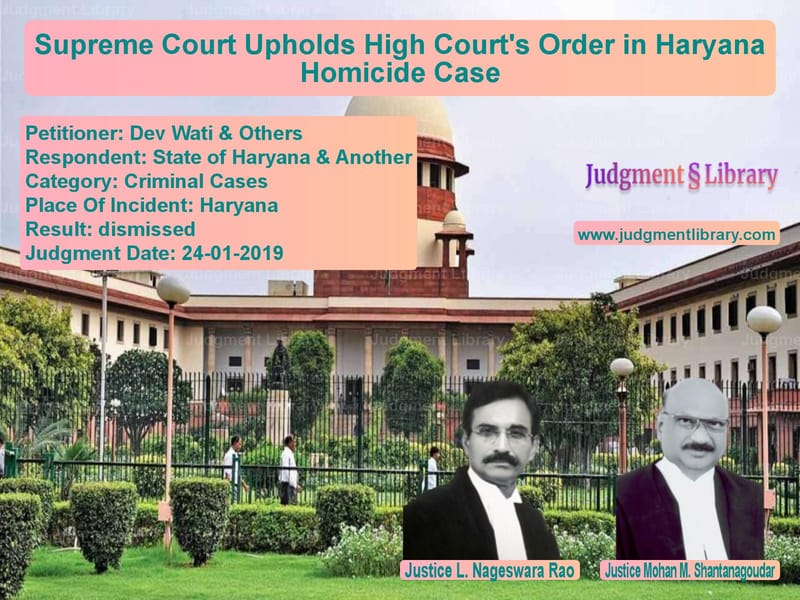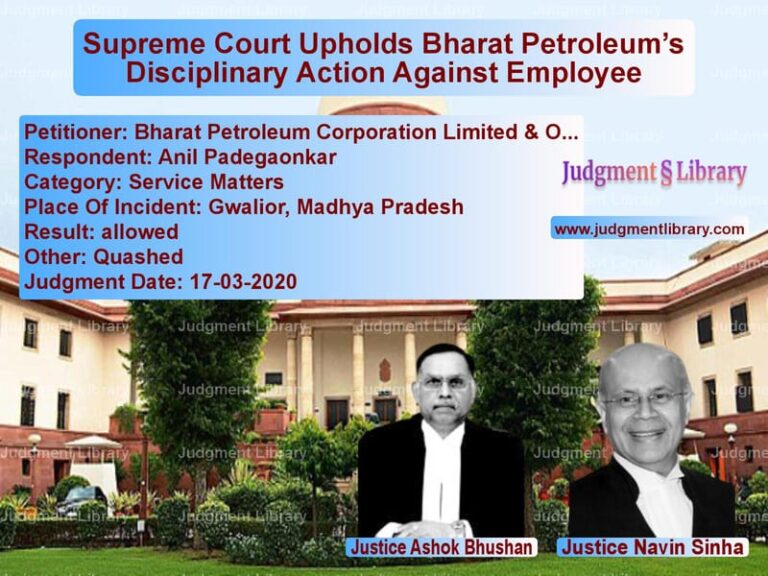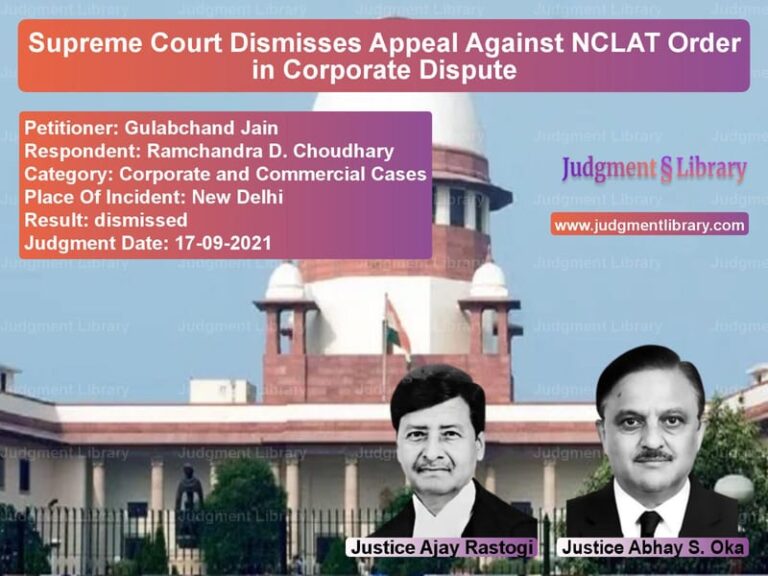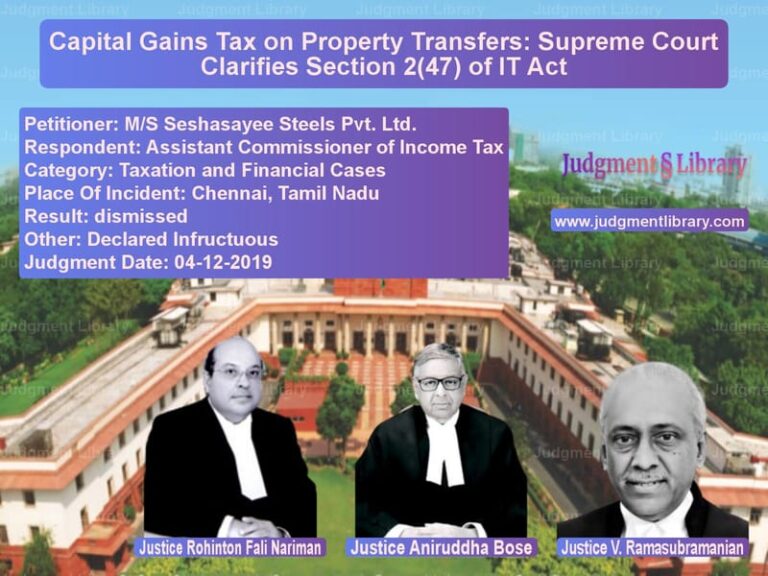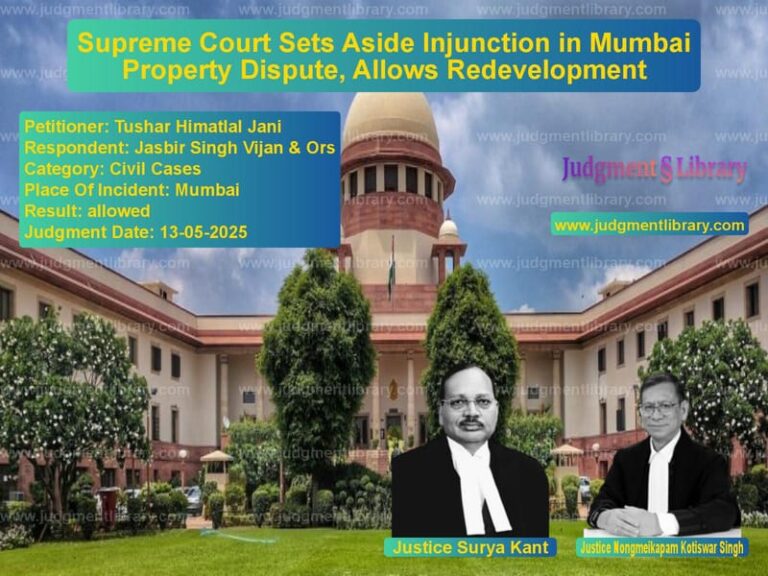Supreme Court Upholds High Court’s Order in Haryana Homicide Case
The Supreme Court of India, in the case of Dev Wati & Others vs. The State of Haryana & Another, addressed a criminal appeal concerning the summoning of additional accused in a homicide case under Section 319 of the Code of Criminal Procedure (CrPC). The Court upheld the decision of the Punjab and Haryana High Court, affirming that the Sessions Court was correct in summoning the appellants to face trial.
Background of the Case
The case arose from a homicide incident in Haryana, where a missing person’s complaint was lodged by the brother of the deceased, Harkesh (P.W.9). Two days after the complaint, the deceased’s body was recovered. Three individuals—Rajpal @ Rajua, Prem Pal, and Devender @ Deven—were charged under Section 302 read with Section 34 of the Indian Penal Code (IPC), among other offenses.
During the trial, P.W.9, Harkesh, testified that additional individuals, including the deceased’s wife (Dev Wati) and her relatives, were involved in the crime. Based on this testimony, the complainant filed an application under Section 319 CrPC, seeking to summon six additional accused, including the deceased’s wife, her brothers, sister, and nephews.
Legal Proceedings and Challenges
- The Sessions Court allowed the application under Section 319 CrPC, summoning the additional accused.
- The High Court of Punjab and Haryana upheld the Sessions Court’s decision on October 16, 2014.
- The appellants challenged the High Court’s order before the Supreme Court, arguing that their summoning was based solely on an unreliable witness statement.
Arguments by the Petitioner (Dev Wati & Others)
The petitioners contended:
- The testimony of P.W.9, Harkesh, was unreliable and contradicted earlier statements.
- The police investigation had not initially named the petitioners as accused.
- Multiple criminal cases and matrimonial disputes between the deceased and his wife existed, suggesting a biased implication.
- The trial court’s decision to summon additional accused was excessive and based on weak evidence.
Arguments by the Respondent (State of Haryana & Another)
The respondents countered:
- The testimony of P.W.9 established a direct link between the petitioners and the crime.
- The deceased was last seen with the additional accused before his death, strengthening the case against them.
- Under Section 319 CrPC, a prima facie case was sufficient to summon the accused, and a detailed trial would determine their guilt.
Supreme Court’s Observations
The Supreme Court, comprising Justices L. Nageswara Rao and Mohan M. Shantanagoudar, examined the case and noted:
“The power under Section 319 CrPC is to be exercised sparingly, but when the evidence indicates the possibility of an accused’s involvement, the court has the authority to summon additional accused to face trial.”
The Court further observed:
“The High Court correctly applied the test laid down in Hardeep Singh v. The State of Punjab [(2014) 3 SCC 92], which requires that the evidence against the additional accused must be stronger than a mere probability but short of the standard required for conviction.”
The Supreme Court also pointed out that the post-mortem report confirmed a homicidal death, supporting the prosecution’s claim.
Final Judgment
The Supreme Court ruled:
“We decline to interfere with the impugned judgment. Accordingly, the appeal stands dismissed.”
With this ruling, the accused were required to face trial based on the evidence presented against them.
Significance of the Judgment
- Clarification on Section 319 CrPC: The ruling clarifies that summoning additional accused requires more than a mere probability but does not demand evidence strong enough for conviction.
- Protection of Victims’ Rights: The decision ensures that potential accused cannot escape prosecution due to procedural loopholes.
- Judicial Oversight in Criminal Trials: The judgment reinforces the principle that courts must carefully scrutinize evidence before summoning additional accused.
Conclusion
The Supreme Court’s ruling in this case reaffirms the importance of allowing thorough trials when evidence suggests the involvement of additional accused. By dismissing the appeal, the Court upheld the prosecution’s right to present its case fully before the trial court.
Petitioner Name: Dev Wati & Others.Respondent Name: State of Haryana & Another.Judgment By: Justice L. Nageswara Rao, Justice Mohan M. Shantanagoudar.Place Of Incident: Haryana.Judgment Date: 24-01-2019.
Don’t miss out on the full details! Download the complete judgment in PDF format below and gain valuable insights instantly!
Download Judgment: Dev Wati & Others vs State of Haryana & A Supreme Court of India Judgment Dated 24-01-2019.pdf
Direct Downlaod Judgment: Direct downlaod this Judgment
See all petitions in Murder Cases
See all petitions in Attempt to Murder Cases
See all petitions in Bail and Anticipatory Bail
See all petitions in Judgment by L. Nageswara Rao
See all petitions in Judgment by Mohan M. Shantanagoudar
See all petitions in dismissed
See all petitions in supreme court of India judgments January 2019
See all petitions in 2019 judgments
See all posts in Criminal Cases Category
See all allowed petitions in Criminal Cases Category
See all Dismissed petitions in Criminal Cases Category
See all partially allowed petitions in Criminal Cases Category

